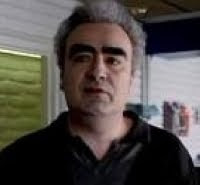Islamic State of Iraq and the Levant
 |
“IS you ISIS or ISIL you ain’t my baby?”
– Louis Jordan on these guys
The Islamic State of Iraq and the Levant (ISIL) (name used by idiots), or alternatively the Islamic State of Iraq and Syria (ISIS), recently abbreviated to The Islamic State (IS), or what Snoop Dogg called For ISIL My Nizzle, or what some Muslims propose calling the Un-Islamic State,[1] previously known variously as the State, as well as al-Qaeda in Iraq, not to mention the Islamic State of Iraq, and on occasion the Islamic State of Iraq, Syria, the Levant and Young (ISISLY), and it would be rude not to include the Game of Thrones-esque The Organisation of Jihad's Base in the Country of the Two Rivers, and then there was the Islamic State of Iraq and al-Sham, the short-lived Organisation of Monotheism and Jihad, the more bureaucratic-sounding Mujahideen Shura Council, the somewhat more intuitive al-Qaeda Separatists in Iraq and Syria, the minimalist $ and the rather more plagiaristic ![]() ... is the least decisive terrorist group in Jihadi history.
... is the least decisive terrorist group in Jihadi history.
Penn State
Though now associated with Islamic terrorism, The State was formed at an undetermined point in the 1970s by James Bradman in Pittsburgh, Pennsylvania, in response to the growing civil rights movement in the US, and largely espoused white separatist policies.
The original name was inspired by Bradman's alma mater, Penn State University, which he regarded as one of the noblest institutions in the country, despite his time on the college's football team being marred by occasional instances of sexual abuse at the hands of his coach.[2] Clearly not traumatized, Bradman preached outside his local shopping mall for several years on the evils of black folk, during which The State's membership remained obstinately stuck at one.
As the decade wore on, though, Bradman's focus on the threat facing Pennsylvania shifted from blacks to Communists, and his tirades about the imminent danger of a nuclear war with the Soviet Union attracted the attention of Amir Suliman, an Afghan-American immigrant with a deep-seated loathing for all things Russian.
Suliman's role in the organisation was initially small, chiefly consisting of bringing Bradman a complimentary Little Tree air freshener from the carwash where he worked, and swapping Russian reversal jokes over coffee. However, towards the end of the decade, when Bradman was hit by a stroke in 1979 — the same year in which the Soviets invaded Suliman's native Afghanistan — the State's destiny changed.
Suliman single-handedly represented the State against the Russians in Afghanistan. Despite fighting bravely, he was always treated by the Afghans as an "American" outsider. They even mockingly gave him a tacky gold-plated dollar sign necklace. As Suliman did not know of an effective way to translate "State" into Pashto, he decided to make the $ sign the group's symbol. It was a bold riposte to his comrades' teasing, although he failed to recruit any new members.
It was here that Suliman met Sam, a Saudi Arabian volunteer who spoke English. The two got on like a house skyscraper on fire, and Sam explained that the Americans were supplying weapons and intelligence to Pakistan, who in turn were using contacts within Sam's family, the Bin Ladens, to bring everything to the front line. This surprised Suliman, as Sam's explanation implied that the Pakistani people had the capability to become more intelligent at all.
During the 1980s, Sam would become a big cheese in Afghanistan. With Abdullah Azzam, he co-formed Maktab al-Khidamat, an organisation which funnelled money, arms and fighters from around the Arab world into Afghanistan. Sam was a growing influence on Suliman's group's views. When Suliman explained to Sam that he was primarily in favour of keeping Russians out of a) Afghanistan and b) Pennsylvania, Sam replied that this was a start, but what he really should work towards was a kind of Muslim super-state, called a caliphate.
Place at the formation of al-Qaeda
Unfortunately, Sam's vision of an all-encompassing state was hampered by his natural tendency to be pissy with people. As well as non-believers, Shia Muslims (commonly misspelled on a keyboard as Shit Muslims) would also not be welcome in the new state, and to be honest, he wasn't crazy about Afghans either.
While Abdullah Azzam insisted all the group's soldiers fight alongside each other regardless of race or nationality, Sam frequently complained that[3] Afghans were illiterate smelly people whose national sport, buzkashi, consisted of riding around on horseback trying to smack a goat's carcass into a goal.
As a result, Sam decided to abandon the cause and form his own group, al-Qaeda. Suliman, though reluctant to join forces with Sam without first checking it was OK with old Jimmy Bradman, did go so far as to accompany him in deserting, having also been unimpressed by his compatriots' attitude to personal hygiene, and their related disdain for his Little Tree air fresheners.
He agreed to change his own organisation's symbol from the undesirably American $ to the more ambiguous ![]() symbol, which Sam had told him was a mix of a sword and the Muslim crescent moon sign. The sword was a subtle nod to Sam's sword-swallowing days in college at Penn State. (Or whatever college he went to; I don't fucking know, and I'm too lazy to scroll up and check. Sorry admins.)
symbol, which Sam had told him was a mix of a sword and the Muslim crescent moon sign. The sword was a subtle nod to Sam's sword-swallowing days in college at Penn State. (Or whatever college he went to; I don't fucking know, and I'm too lazy to scroll up and check. Sorry admins.)
Historians often blame the adoption of this symbol, whose pronunciation remains disputed, for the consequent confusion over Suliman's group's name. When Sam secured Suliman and three new recruits a passage into Iraq, local news authorities chose differing names to describe the four-man mini-group, which quickly became notorious for inflicting of wedgies and noogies on the locals, including al-Qaeda in Iraq.
1990s: deaths in the family
James Bradman finally gave up the ghost on March 21, 1990, presumably consoled by the recent dissolution of the Soviet Union. Suliman was apparently free to make the group his own, but was hit the following year by a lawsuit by American pop sensation Prince, who accused him of breach of copyright over his group's logo. The case was ultimately settled out of court, but it took its toll on Suliman, now 64, and he died of a heart attack in Iraq's only Taco Bell.
The group was thus inherited by Abu Musab al-Zarqawi, who, despite being one of the men who had made the trip with Suliman to Iraq, was not enitrely aware he was part of a radical organisation until he received a copy of Suliman's will. Unconvinced by the "al-Qaeda in Iraq", he renamed the group The Organisation of Monotheism and Jihad (JTJ) in 1999, proclaiming: "New millennium, new name, same great taste."
2000s: 9/11 and civil war
The group lost contact with Sam, the reason for which became apparent in September 2001. The JTJ had a hard time reconciling their rather run-of-the-mill suppression of Iraqi Shias with their friend's below-average piloting skills, but they did so anyway despite the Quran's opposition to the union of a man with another man.
In October 2004 the group leader managed to get Sam's email address, and swore loyalty to him on MSN. They changed the name of the group to Tanẓīm Qāʻidat al-Jihād fī Bilād al-Rāfidayn, The Organisation of Jihad's Base in the Country of the Two Rivers, after Sam pointed out that "monotheism" ran the risk of making the group sound overly welcoming, and could lead to Jews and Christians trying to join.
However, Sam's relationship with Abu Musab al-Zarqawi was strained. It turned out that Abu, while competent at beating country peasants with sticks, was not made for the volatile state that was Iraq in the 21st century. A number of tactical blunders (including the assassination of a Liberian dignitary when al-Qaeda were gunning for folks from Libya) meant that the group was absorbed into an union of Iraqi insurgents called the Mujahideen Shura Council.
Al-Zarqawi was killed in June 2006 after falling down an open manhole, and the group's direction shifted again. Al-Zaraqwi's death was found offensive by many, due to the Quran's condemning of a man entering another man's hole.
2010s: rise and rebranding
| Part of a series of articles on |
| Islam |
|---|
 |
 |
The Mujahideen Shura Council joined with four more insurgent factions and the representatives of a number of Iraqi Arab tribes, bringing the combined group to a total of 21 men. Together, they swore to:
- free Iraq's Sunnis from what they described as Shia and foreign oppression.
- further the name of Allah and restore Islam to glory.
- watch (in a nod to their Pennsylvanian origins) as many Pittsburgh Steelers games as possible.
After a tiresome day of squabbling, games of backgammon and the drawing of straws, the group agreed upon the name People's Islamic State of Salvation (PISS), apparently not realising that PISS also stands for Pakistan Intelligence and Surveillance Service, Pakistan's intelligence service.[4]
Abu Abdullah al-Rashid al-Baghdadi al-Jamali al-Basheeri al-Khubadi al-lah became PISS's figurehead leader, although the real power resided with the Egyptian Abu Ayyub al-Masri. Both were killed by poisoned sausages during a hotdog-eating contest in April 2010. This confused the PISS members, as sausage-swallowing was commonly frowned upon (as per the Quran's opposition to sodomy). US intelligence suggests it was an internal coup staged by members who were concerned that Abu Abdullah's magnificently lengthy and very girthy name would make them feel out-competed and insignificant. This "suggestion" offended the PISS members, who proceeded to mock the US intelligence agency's decision to call themselves an agency of "intelligence." A "moderated" "debate" ensued between the two organizations, in which the US intelligence agency took the piss out of PISS by saying that Abu Abdullah's horse-cock sized name was only referring to his ability to be a massive dick.
Some PISS employees allege that Abu Abdullah faked his own death at the glizzy gulping contest so he could leave PISS due to his alleged reputation to dick around during work hours, which was causing him a lot of social backlash. This conspiracy theory details that he took a plane that landed in Argentina (and, surprisingly, not into another building in Manhattan) but was recognized at customs and beaten to death for his crimes (See cock and ball torture).
The next leader of the PISS was, however, called Abu Bakr al-Baghdadi. He is also the current leader of the Islamic State of Iraq and Syria (ISIS), which is the same thing. Seeing that the organization was being ridiculed for having been led by the second major political leader in history to secretly flee to Argentina, he spent $2 million USD in a rebranding effort to give the organization a new identity. One of these changes included a logo redesign, the intention of which was to make ISIS seem more hip, dope, and funky fresh to the under-18 demographic of America. This had no effect, as many under-18s already express a strong desire to join terrorist organizations (as evidenced by my psychotic 16-year old brother). The redesign initially backfired, as Americans were hot off the heels of Discord's logo redesign and were sick of the corporate trend of simplification. Their rebranding gained a strong amount of traction in the UK, however, as the average British person has trouble comprehending images with more than four letters or colors in them.
On April 8, 2013, the group adopted the name the Islamic State of Iraq and the Levant (ISIL), but were also occasionally referred to as Islamic State of Iraq and al-Sham. While these names continue to be used by some news agencies, many group members complained that, given their goal of setting up a Muslim caliphate, such a name would have to be expanded with each conquered country, e.g. Islamic State of Iraq and Iran and the Levant or Islamic State of Iraq and Iran and Egypt and the Levant.
As a result the group resorted to paying millions to a New York-based PA company, which changed the organisation's name to Islamic State (IS). The move was widely criticised for its cost and the inherent Googling problems of "IS", but at the time of writing remains the group's name (presumably to combat the influx of under-18s who would use Google to find ISIS execution videos).
See also
- UnNews:Biden: We will pursue ISIS through Heaven’s Gate
- UnNews:Obama affirms action against ISIS, warm fuzzy feelings
- UnNews:Obama to outline IS strategy after consulting Stonehenge gods
- UnNews:US congratulates $ on Syria success
Footnotes
- ↑ http://www.independent.co.uk/news/uk/home-news/isis-call-it-the-unislamic-state-say-muslim-groups-as-another-hostage-is-murdered-9731823.html
- ↑ UnNews:UPDATE: Joe Paterno legacy secure for now
- ↑ Arab soldiers are polite, good listeners with an effortless sense of style.
- ↑ Just imagine a world where it was hard to distinguish the Pakistan secret services from a terrorist group!












